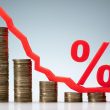The Federal Reserve, the central banking system of the United States, plays a pivotal role in shaping the country’s economic landscape through its monetary policy decisions. Recently, Fed officials have signaled that there might be just one rate cut before the end of 2024. This announcement has significant implications for various sectors of the economy, from consumer borrowing to business investments and financial markets.
Understanding the Fed’s Monetary Policy

The Federal Reserve uses monetary policy tools, primarily interest rates, to achieve its dual mandate: maximum employment and stable prices. By adjusting the federal funds rate, the rate at which banks lend to each other overnight, the Fed influences overall economic activity. Lowering interest rates typically stimulates economic growth by making borrowing cheaper, whereas raising rates can help control inflation by making borrowing more expensive.
The Current Economic Context
As of mid-2024, the U.S. economy is navigating a complex environment characterized by mixed signals. On one hand, inflation has moderated from the peaks seen in the previous years, thanks to the Fed’s aggressive rate hikes. On the other hand, economic growth has slowed, and there are concerns about a potential recession. Unemployment remains relatively low, but wage growth has started to decelerate.
Fed’s Recent Rate Decisions
Over the past two years, the Fed has raised rates significantly to combat inflation, which soared due to supply chain disruptions, high demand post-pandemic, and geopolitical tensions affecting energy prices. The central bank’s recent communication indicates a shift from rate hikes to a more cautious approach, with a potential rate cut before the end of 2024. This signal suggests the Fed believes inflationary pressures are easing and the economy might need a boost to sustain growth.
Implications of a Rate Cut
A rate cut, even a single one, can have profound effects on the economy:
- Consumer Borrowing: Lower rates make loans cheaper, potentially boosting consumer spending on big-ticket items like houses and cars.
- Business Investments: Reduced borrowing costs can encourage businesses to invest in expansion, leading to job creation and economic growth.
- Financial Markets: Lower rates typically benefit equity markets as investors seek higher returns, potentially leading to increased stock prices.
- Exchange Rates: A rate cut could weaken the dollar, making U.S. exports more competitive but also increasing the cost of imports.
Analysis of Fed’s Signaled Rate Cut
The Fed’s indication of just one rate cut before the end of 2024 reflects a cautious optimism about the economy’s trajectory. The central bank appears confident that inflation will remain under control but is also preparing to support growth if needed. This approach balances the need to sustain the economic recovery without reigniting inflation.
Table 1: Analysis of Key Economic Indicators
| Indicator | Current Status (Mid-2024) | Expected Impact of Rate Cut |
|---|---|---|
| Inflation | Moderated (around 3%) | Further reduction due to lower costs |
| Economic Growth | Slowing (GDP growth 1-2%) | Potential boost in GDP growth |
| Unemployment Rate | Low (around 4%) | Could decrease further with job creation |
| Wage Growth | Decelerating | Stabilization or slight increase |
| Consumer Spending | Moderate | Increase due to cheaper borrowing |
| Business Investment | Cautious | Increase due to lower financing costs |
Comparative Analysis with Past Rate Cut Cycles
To understand the potential outcomes of the Fed’s decision, it’s useful to compare with past rate cut cycles.
Table 2: Comparative Analysis of Past Rate Cut Cycles
| Period | Economic Context | Fed’s Action | Outcome |
|---|---|---|---|
| 2001-2003 | Post-9/11 recession, tech bubble burst | Multiple rate cuts | Stimulated recovery, but led to housing bubble |
| 2007-2009 | Global financial crisis | Aggressive rate cuts | Prevented deeper recession, initiated slow recovery |
| 2019 | Trade tensions, slowing global growth | Series of rate cuts | Extended economic expansion pre-pandemic |
| 2024 (Projected) | Post-pandemic stabilization, mixed signals | Single rate cut | Expected to support growth without high inflation |
Strategic Considerations for Investors
Investors should consider the implications of a potential rate cut on their portfolios. Historically, lower interest rates have been favorable for equities, especially in sectors like technology and consumer discretionary. Fixed-income investments might see lower yields, prompting a shift towards higher-risk assets for better returns. Additionally, real estate and commodities could benefit from increased investment and consumer spending.
Conclusion
The Fed’s signal of just one rate cut before the end of 2024 suggests a nuanced approach to monetary policy, reflecting confidence in inflation control and a readiness to support economic growth. This decision will have wide-ranging effects on consumer behavior, business investments, and financial markets. By comparing with past cycles, it becomes evident that while the context and outcomes might differ, the Fed’s overarching goal remains to foster a stable and growing economy. Investors and policymakers alike will need to stay attuned to these signals and adjust their strategies accordingly.
Future Outlook
As we move towards the latter part of 2024, the economic indicators will continue to guide the Fed’s actions. Should inflation unexpectedly rise, the Fed might delay or reconsider the rate cut. Conversely, if economic growth falters significantly, more aggressive monetary easing could be on the table. The central bank’s communication and data-driven approach will be critical in navigating these uncertain times.
By maintaining a balance between promoting growth and controlling inflation, the Fed aims to steer the economy towards a sustainable recovery. Observers will keenly watch the developments, making informed decisions based on the Fed’s evolving policy stance.












